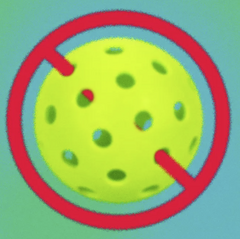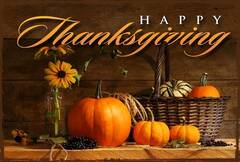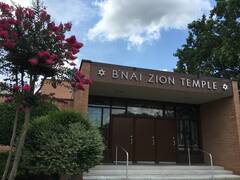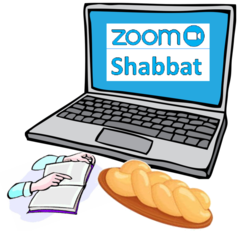Worship at B'nai Zion
Friday Night Erev Shabbat Services
Friday night, we begin the celebration of Shabbat with a warm,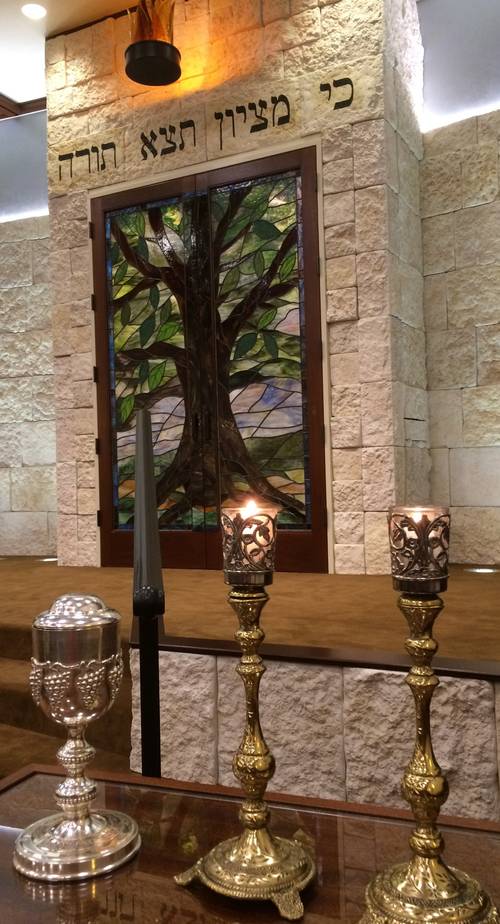 spiritually uplifting service beginning at 6:00 PM in the sanctuary. The rich mixture of traditional and contemporary music and prayer encourages all to participate. Like all of our services, our Erev Shabbat liturgy honors both Jewish tradition and the modern egalitarian spirit that is the hallmark of Reform Judaism. We use Mishkan T'filah, the newest prayer book of the Reform Jewish Movement. During the service, Rabbi Jana will offer inspirational insights and a sermon. Music is led by our Cantorial Soloist Adam Philley (who also plays keyboard) and Rabbi Jana (who also plays guitar). We always conclude our service around 7:00 PM. Sometimes our Oneg Shabbat is on Zoom: a time to meet with new and old friends from around the country. The Friday evening service is usually streamed “live” and available afterwards at the B’nai Zion YouTube channel.
spiritually uplifting service beginning at 6:00 PM in the sanctuary. The rich mixture of traditional and contemporary music and prayer encourages all to participate. Like all of our services, our Erev Shabbat liturgy honors both Jewish tradition and the modern egalitarian spirit that is the hallmark of Reform Judaism. We use Mishkan T'filah, the newest prayer book of the Reform Jewish Movement. During the service, Rabbi Jana will offer inspirational insights and a sermon. Music is led by our Cantorial Soloist Adam Philley (who also plays keyboard) and Rabbi Jana (who also plays guitar). We always conclude our service around 7:00 PM. Sometimes our Oneg Shabbat is on Zoom: a time to meet with new and old friends from around the country. The Friday evening service is usually streamed “live” and available afterwards at the B’nai Zion YouTube channel.
Shabbat Morning Torah Study and Service
Shabbat morning, we join together 9:45 AM on Zoom. Rabbi Jana leads a discussion of the Torah portion of the week. Often discussions are accompanied by videos and other media that provide alternate interpretations. The Torah Study is followed by a Shabbat Morning Service that begins around at approximately 11:00 AM. This service is usually a casual, inspirational and learning experience led by Rabbi Jana. At noon we end our worship with blessing challah.
KID-dush Shabbat (Shabbat for Children)
KID-dush Shabbat is a fun, engaging, half-hour service for families with young children. We sing songs and prayers, move around a lot, listen to a story told by Rabbi Jana, and share some juice and challah. We typically have KID-dush Shabbat from 9-9:30 AM on Saturday mornings once a month. Click HERE to go to the KID-dush Shabbat page for links to prayers, songs, games, and stories. The Events page will show when there is KID-dush Shabbat. Please contact Rabbi Jana if you are interested in attending.
The High Holy Days are Rosh HaShanah and Yom Kippur. Jews are forbidden to work on the High Holy Days, and the overwhelming majority attends worship services and family gatherings on these days.
Rosh HaShanah: Rosh means “beginning of” and Ha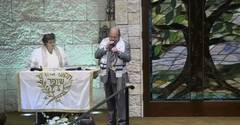 Shanah means “the year.” The Jewish New Year marks the beginning of a ten-day period of spiritual renewal known as the Jewish High Holy Days. Rosh HaShanah is marked by worship services, prayers for Divine forgiveness for one’s shortcomings, and the sounding of the shofar. Rosh HaShanah comes on the first day of the Hebrew month of Tishrei, which corresponds to the fall in the secular calendar (Leviticus 23:24; Numbers 29:1; and Nehemiah 8:2-3).
Shanah means “the year.” The Jewish New Year marks the beginning of a ten-day period of spiritual renewal known as the Jewish High Holy Days. Rosh HaShanah is marked by worship services, prayers for Divine forgiveness for one’s shortcomings, and the sounding of the shofar. Rosh HaShanah comes on the first day of the Hebrew month of Tishrei, which corresponds to the fall in the secular calendar (Leviticus 23:24; Numbers 29:1; and Nehemiah 8:2-3).
Yom Kippur: Yom means “day” and Kippur means “atonement.” Yom Kippur is the holiest day in the Jewish calendar. The Day of Atonement begins at sundown on the tenth day of the month of Tishrei. The whole day of Yom Kippur is devoted to fasting, prayer, repentance, reconciliation and forgiveness with our family, friends, neighbors and God. The services include a Yizkor (memorial) service to honor our deceas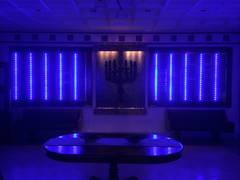 ed loved ones. While fasting is important, one may not fast if doing so endangers his/her health (Leviticus 16:30-31; 23:27-32).
ed loved ones. While fasting is important, one may not fast if doing so endangers his/her health (Leviticus 16:30-31; 23:27-32).
B’nai Zion services for the High Holy Days are enhanced by our wonderful choir. We do not require tickets to attend our services. We provide childcare, and also offer services for young children.
Other Holy Day Festivals
B’nai Zion offers a complete schedule of services in observance of the Festivals. The three pilgrimage Festivals were originally associated with travel (pilgrimage) to the ancient Temple in Jerusalem to offer prayers and sacrifices (Exodus 23:14-16; Deuteronomy 16:16). For thousands of years, Jews have observed these Biblical Holy Days by attending services at Synagogues and by gathering with family for sacred celebrations in their homes.
Note: B'nai Zion follows the schedule of Festival observances in accordance with the Biblical instructions and in keeping with the observance of all Jews in Israel.
Pesach, or Passover, is the seven day spring Festival that celebrates our liberation from Egypt (Exodus 12:17-27; 34:18.) While the Passover seder on the first night is most appropriately in our homes, B’nai Zion offers a congregational seder for members and guests. The Festival concludes on the 7th day with a service in morning. Yizkor, memorial prayers, are recited at the morning of the 7th day.
Shavuot is the “Feast of Weeks.” It comes seven weeks after Passover and marks both the barley harvest and a celebration of the giving of The Decalogue. (Exodus 34:22; Deut. 16:9-10). B’nai Zion traditionally has a Shavuot service on the Shabbat evening closest to Shavuot that is led by the Confirmation class. The morning service on Shavuot includes Yizkor, memorial prayers.
Sukkot is the fall harvest Festival. It lasts for seven days and concludes with t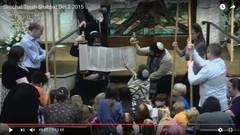 he Festival of Shemini Atzeret-Simchat Torah on the eighth day (Leviticus 23:34; Deuteronomy 16:13). Jews eat and many sleep in Sukkot (literally, “booths,” the singular is “Sukkah”) during this Festival. Shake the lulav and etrog in our beautiful sukkah. For Shemini Atzeret-Simchat Torah we will have an evening service on the Shabbat closest to the holy day when we Consecrate our young students, and everyone dances with the Torah scrolls. The morning service includes Yizkor, memorial prayers.
he Festival of Shemini Atzeret-Simchat Torah on the eighth day (Leviticus 23:34; Deuteronomy 16:13). Jews eat and many sleep in Sukkot (literally, “booths,” the singular is “Sukkah”) during this Festival. Shake the lulav and etrog in our beautiful sukkah. For Shemini Atzeret-Simchat Torah we will have an evening service on the Shabbat closest to the holy day when we Consecrate our young students, and everyone dances with the Torah scrolls. The morning service includes Yizkor, memorial prayers.
The Minor Festivals: Purim and Hanuk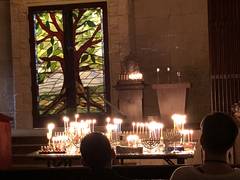 kah
kah
Hanukkah and Purim are celebrated at B’nai Zion with wonderful, family friendly services and programs that glow with the joy and spirit of our heritage. We often have Shabbat Dinner and special services. For Purim there will be a Purim Schpiel – often multi-media, and for Hanukkah each household brings a hanukiyah and we kindle them together before the service.
CLICK HERE FOR ADDITIONAL INFORMATION DURING THE PANDEMIC.
Upcoming Events:
nt.


